6 of the greatest – and worst – coming out moments in TV history, from Schitt’s Creek to The Office
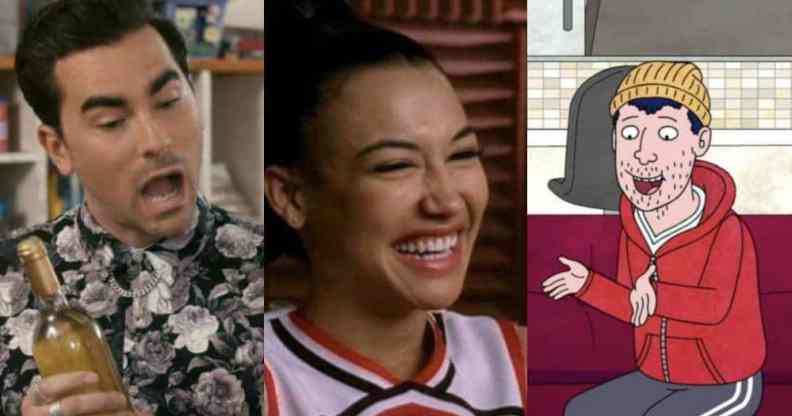
Several TV shows feature coming out scenes, but only some shows handled the event gracefully and with respect to the LGBT+ community. (Netflix/Schitt’s Creek/Fox/BoJack Horseman)
With LGBT+ representation on screens gradually improving – in fits and starts – coming out moments are becoming a TV staple.
Coming out can be a journey, and TV shows have tried to tackle that intricate, integral moment in an LGBT+ person’s life in a variety of ways – with some more successful than others.
The best are those that reverberate beyond the screen – Ellen DeGeneres’ iconic sitcom coming out changed TV as we know it, while Schitt’s Creek’s wine bottle analogy educated the world on pansexuality in an arguably unprecedented way.
But for every powerful, moving on-screen coming out, there is a cringe-worthy, if not outright offensive one. Hopefully, we’re moving beyond the days of LGBT+ people’s comings out being used as a punchline, as representation behind and in front of the camera improves.
But for now, here are some of TV’s most memorable coming out scenes – for both good and bad reasons.
1. Ellen Morgan – Ellen
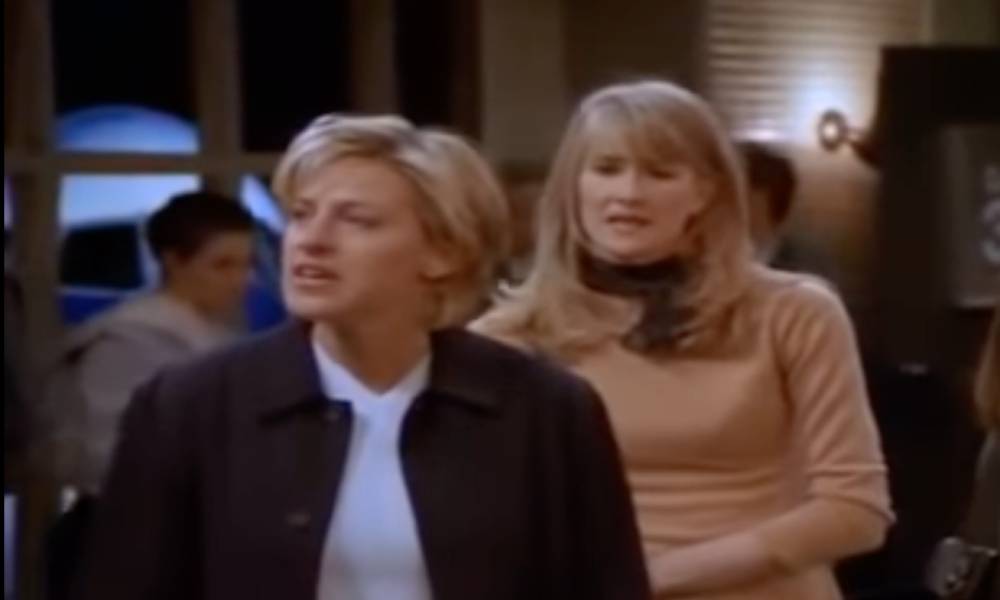
Ellen Morgan comes out as a lesbian to her love interest in the middle of an airport waiting room in the 1997 “Puppy Episode” of the sitcom ‘Ellen’. (YouTube/R. Davis/ABC)
If we’re going to talk about historic coming out moments, Ellen has to be mentioned. When Ellen DeGeneres’ character, Ellen Morgan, came out as gay on the sitcom, it sent shockwaves through America.
In the 1997 “Puppy Episode”, Ellen awkwardly confesses to her love interest, Susan (Laura Dern), that she is a lesbian. Throughout the episode, Ellen works with others to realise her truth and her feelings for Susan before confronting Susan in an airport – very dramatic, very 90s.
Ellen initially fumbles around, trying to get the words out before blurting out that she’s gay. The confession is accidentally picked up the airport waiting room’s PA system, which defused the pressure of the moment.
The verdict: An estimated 42 million viewers watched the hour-long Ellen special – there had been rumours for months beforehand that the character would come out, and the real-life Ellen confirmed that she’s gay a week before the episode aired. Only a handful of queer characters had been seen on TV by the time the 1997 episode aired, and none of them were leading characters. Both DeGeneres and Dern saw their careers suffer in the aftermath – though fortunately, both have since bounced back.
The “Puppy Episode” had a profound impact on Hollywood and beyond, and it definitely paved the way for future coming out scenes in TV.
2. David Rose – Schitt’s Creek
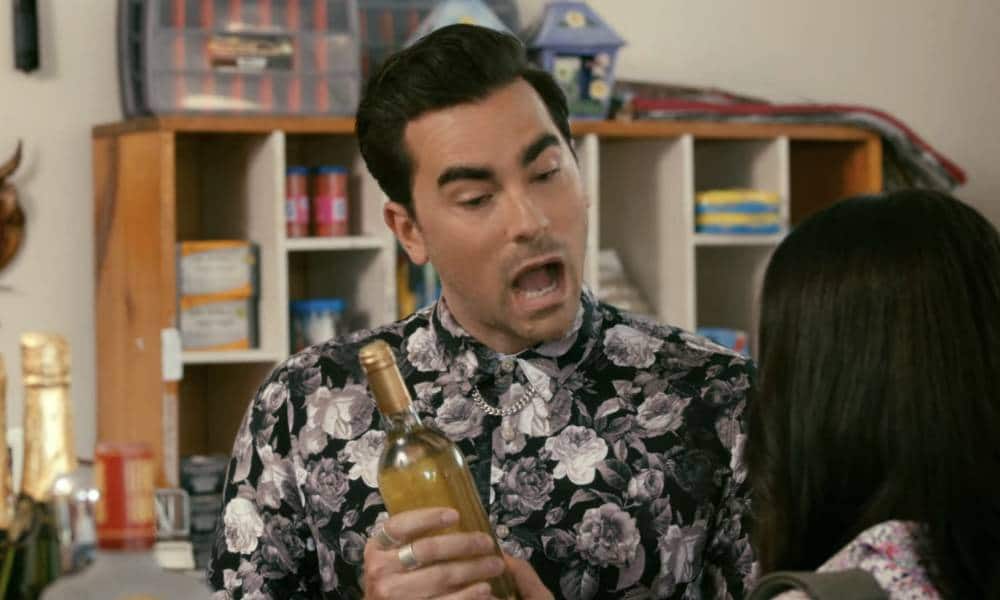
David Rose explains his pansexuality to Stevie Budd using a wine analogy. (Netflix/Schitt’s Creek)
There are countless reasons to watch Schitt’s Creek. It’s hilarious, moving and unlike anything else on TV – but it’s also given us of the best modern examples of queer representation on screen.
Perhaps one of the show’s most iconic scenes happened when David (Dan Levy) explained his sexuality to his Stevie Budd (Emily Hampshire), who assumed he was gay.
After they sleep together, Stevie approaches David’s sexuality while the pair are looking at wines. Stevie says that she is a “red wine drinker” and was “under the impression that you too only drank red wine”. David catches on and uses a beautiful analogy to clear up Stevie’s confusion: “I like the wine and not the label.”
The verdict: The power of this coming out scene is palpable. Schitt’s Creek handles this whole plot line about David’s pansexuality so well, and it’s not the butt of a joke. He isn’t ridiculed for liking all the wines, and his sexuality is just accepted without a second thought.
The scene was so powerful in fact that Emily Hampshire, who played Stevie, told Demi Lovato on their 4D with Demi Lovato podcast that it helped her come out as pansexual.
3. Rosa Diaz – Brooklyn Nine-Nine
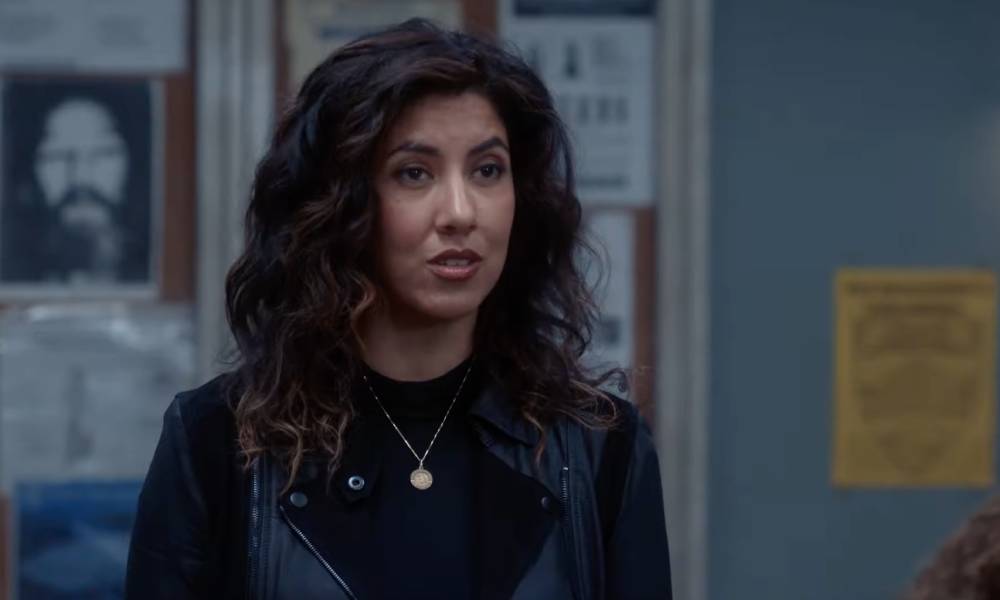
Rosa Diaz comes out publicly as bisexual to the Nine Nine and reveals she was attracted to characters from Saved By the Bell when she was younger. (YouTube/Brooklyn Nine-Nine)
The cop-comedy celebrated its 99th episode by putting a spotlight on each character during an insane road trip from Los Angeles to New York. But it also included a big reveal that was central part of the show’s 100th episode: that Rosa (Stephanie Beatriz), the group’s resident badass, is bisexual.
Rosa initially only tells Charles Boyle about her bisexuality in “99” after he catches her talking to another woman on the phone, who calls her “babe”. She eventually comes out to the rest of the squad, and they all accept her. Rosa goes on to reveal that she first knew she was bisexual after watching Saved By the Bell and thought that both Zack Morris and Lisa Turtle were hot.
The verdict: Rosa’s bisexuality came organically as Brooklyn Nine-Nine developed as a series, and her coming out arc is very realistic. She didn’t hide it from her friends because she was ashamed or uncomfortable – she just didn’t mention it because she didn’t think it was anyone’s business.
That mentality was backed up by Stephanie Beatriz, the bisexual actor who played Rosa. She said in an interview with Vulture that she intended to play Rosa as queer and thought if anyone were to ask Rosa, she “would say: ‘Yeah, I date whoever I want,’ but that’s not something she would ever discuss with at work because she’s Rosa”.
4. Todd Chavez – BoJack Horseman
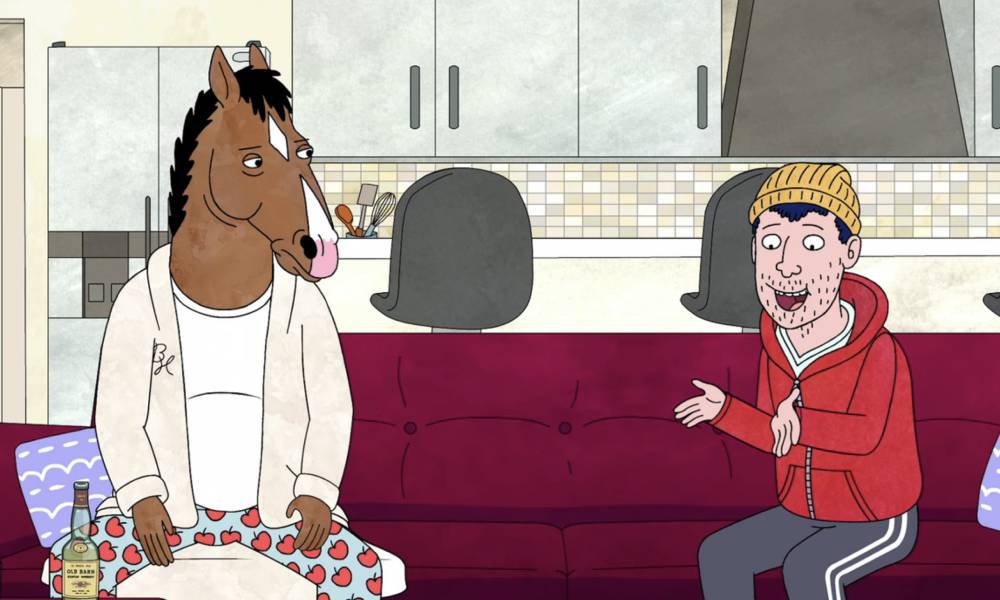
Todd Chavez came out as asexual to his best friend BoJack in the animated show BoJack Horseman. (Netflix/BoJack Horseman)
Todd (Aaron Paul) coming out as asexual to BoJack (Will Arnett) was a huge leap forward for mainstream TV, which doesn’t frequently acknowledge asexual identities. The character’s sexuality was first alluded to in the third season finale when he admitted to his then-girlfriend that he isn’t gay or straight, but instead “might be nothing”.
Todd’s sexuality was later confirmed in season four when he said that he didn’t “think [he’s] allowed to be in love” before eventually coming out as asexual.
The verdict: For an animated show about an anthropomorphic horse, this coming out scene stands above coming out moments with real-life actors. Throughout the show, Todd goes on a journey to discover his sexuality in a fleshed-out, compelling character arch.
His coming out scene was handled in a heartwarming, funny and empathetic way that illustrates the writer’s really took time to consider how the character’s sexuality fit into the show’s narrative.
5. Santana Lopez – Glee
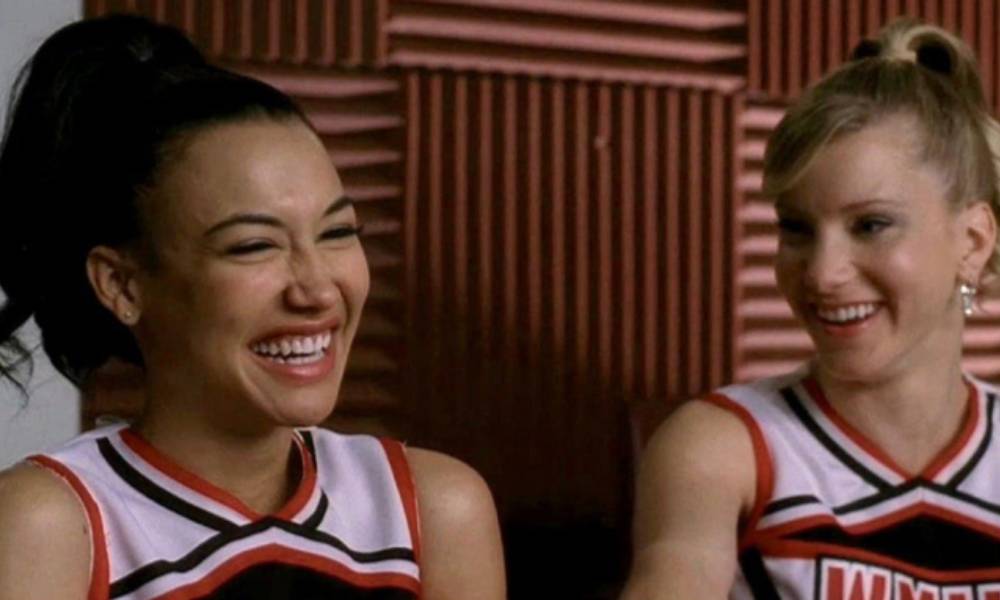
Glee’s Santana and Brittany are one of TV’s most iconic lesbian couples, but it was revealed that not everyone in Sanatana’s family was accepting of their love. (Fox)
Finn outs Santana (Naya Rivera) in a school hallway, with her sexuality later used in a smear campaign against her cheer coach Sue (Jane Lynch), who is running for Congress. Santana, fearing her family will find out, slaps Finn (Cory Monteith) around the face and is suspended. In the following episode, the students come together to sing “I Kissed a Girl” in a misguided show of solidarity, while a creepy jock tells Santana he’s “just the guy who can straighten her out”.
Santana ultimately comes out to her parents, who are accepting of her sexuality. But it’s a different story when she comes out to her grandmother and sadly doesn’t get the same response.
Santana said that she has loved “girls the way I’m supposed to feel about boys” and that she finally understood “what people are talking about when they talk about love” because of Brittany. She told her grandmother: “I love you so much and I want you to know me – who I really am” – only she can’t.
The verdict: Santana’s coming out was hit and miss. Critics questioned why Finn never faced repercussions for outing Santana, while the Katy Perry song choice was also poorly-received. But in a way, the show reflected reality – coming outs are rarely perfect, and sometimes, actions don’t have the consequences that they should. Overall Santana’s coming out was a step forward in terms of queer women of colour being represented on TV. It also highlighted the heartbreaking reality of difficulty in coming out to different generations of families as well as the power of found families with friends and other loved ones like the Glee club.
6. Oscar Martinez – The Office
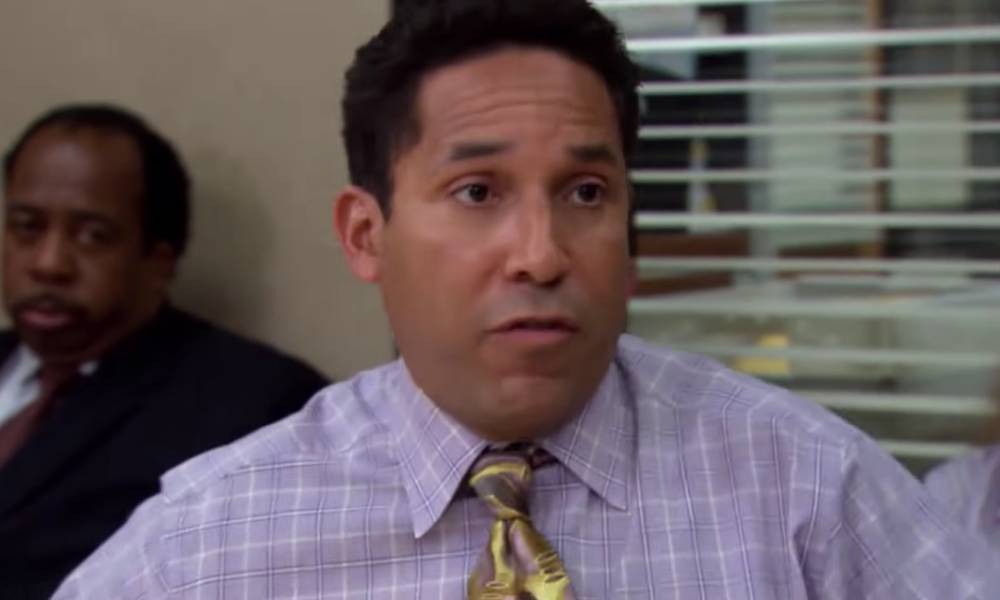
Oscar Martinez is outed as gay by his boss Michael Scott, who then tries to prove to Oscar that he is not homophobic. (YouTube/The Office)
The Office US fans found out in season two that Oscar (Oscar Nunez) is gay when he called in sick from work to go on a date with his boyfriend Gil.
Dwight Schrute, who discovered the truth, didn’t realise Oscar was gay, so crashed the date in return for him not telling their boss Michael Scott about Oscar skiving. Viewers then saw Dwight watching TV with the couple as they held hands behind his back.
Things turned sour in the third season after Michael found out that Oscar is gay and apologised for calling him a homophobic slur – outing Oscar to the entire office in the process.
The verdict: Thankfully, The Office is a comedy because Oscar’s coming out story is something of LGBT+ nightmares. It wasn’t enough that Dwight followed Oscar and inserted himself into his private time with his boyfriend. But then the show goes a step further with Michael outing Oscar and then trying to demonstrate his tolerance for gay men by forcibly kissing him in the conference room in front of all their coworkers. It’s really cringe-worthy.

